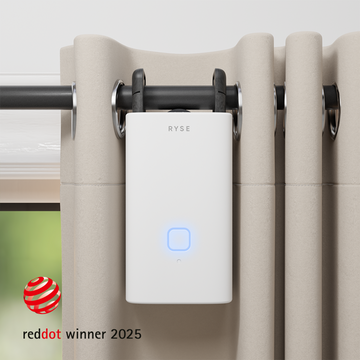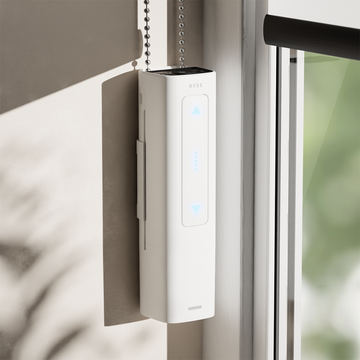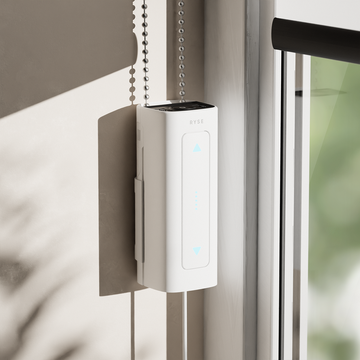Key Takeaways
-
Smart home devices like automated blinds enhance sleep quality by managing light, noise, and temperature without requiring you to remember or manually adjust settings each day.
-
Daily habits and routines help train your body's internal clock, supporting more consistent and restorative rest.
-
Combining tech and lifestyle changes offers the most sustainable path to better sleep.
Why Sleep Needs a Smarter, More Intentional Approach
Sleep is foundational to physical health, emotional resilience, and mental clarity, but for many, it's the most neglected part of daily life. Inconsistent routines, excessive screen time, caffeine, noise, and light pollution can all sabotage your ability to fall asleep and stay asleep.
The solution? A balanced approach that includes smart environmental controls and consistent, supportive habits.
Why automated blinds matter more than manual blackout curtains: While blackout curtains block light effectively, they require you to remember to close them at the right time every night and open them each morning. Smart shades like RYSE automate this process to align with your body's natural rhythms, gradually darkening in the evening to support melatonin production and brightening at your wake time to naturally end sleep. This consistency is what makes them powerful for sleep optimization, not just the darkness itself.
Below, you'll find seven key areas that impact sleep, each backed by research.
1. How to Get Consistent Sleep
Establishing a predictable sleep-wake cycle is one of the most effective ways to improve your sleep quality. It helps your body regulate melatonin production and align with your natural circadian rhythm. But building consistency takes more than just going to bed on time; it starts with your environment.
Why Consistency Matters
-
Trains your brain to release sleep hormones at the right time
-
Improves mood, focus, and daytime energy
-
Supports metabolic and immune function
Smart Strategies to Stay on Track
Automate your light exposure: Use smart blinds like RYSE SmartShades to gradually darken your room in the evening and brighten it in the morning, mimicking sunrise and sunset.
Anchor your routine: Set fixed wake-up and bedtime windows, even on weekends.
Create a wind-down ritual: Reduce stimulation at least 30 minutes before bed. That could mean dimming lights, reading, stretching, or turning on calming music.
Make it shift-worker friendly: For those on rotating schedules, blackout blinds and white noise help simulate nighttime during the day and reduce adjustment stress.
For a deeper dive into this topic, check out the full blog post: How to Get Consistent Sleep: Expert Tips for Restful Nights
2. Sleep Better When You're Stressed
Stress can throw your entire sleep cycle out of balance. When your mind is racing and your body stays tense, it becomes incredibly difficult to relax into sleep, and even harder to achieve the deep, restorative rest your body needs.
Picture this: You've had back-to-back meetings all day, your inbox is overflowing, and you're replaying tomorrow's presentation in your head as you try to fall asleep. Sound familiar? A smart home setup can help break this cycle by reducing sensory input and calming your nervous system, even on the most stressful days.
How Stress Disrupts Sleep
-
Activates the fight-or-flight response, keeping cortisol levels high
-
Suppresses melatonin production, making it harder to feel sleepy
-
Increases cognitive activity, leading to racing thoughts and tension
Smart Sleep Environment Solutions
Block out light distractions: Use RYSE SmartShades to create a dark, cave-like space that helps your brain shift from alertness to rest. You can automate the shades to close at sunset or based on your wind-down schedule.
Use sound to your advantage: Soft rain sounds or white noise machines can mask jarring noises and help relax your mind. Smart speakers with sleep playlists or noise apps are perfect for this.
Regulate room temperature: A room that's too warm or too cold disrupts sleep. Smart thermostats and blinds can help maintain an ideal sleep temperature (typically 60–67°F, though individual comfort varies—some people sleep best at 68–70°F).
Automate routines: Reduce cognitive overload by letting automation handle your nightly routine. Set a "Goodnight" command that dims lights, lowers blinds, and cues up calming sounds, one less decision to make when you're already drained.
You can learn more about improving your sleep during stressful time in the section below:
How to Sleep When Stressed: Smart Strategies for Real Rest
3. How To Get More Deep Sleep
Deep sleep is the most restorative stage of your sleep cycle, it's when your brain consolidates memories, your body repairs tissue, and your immune system gets a critical boost. But if you're constantly waking up tired, there's a good chance you're not getting enough of it.
Factors like noise, light, and bedroom temperature can pull you out of deep sleep without fully waking you, reducing your overall sleep quality without you even realizing it.
How to Improve Your Deep Sleep Naturally
|
Factor |
Why It Matters |
Smart Solution |
|
Light Exposure |
Bright or blue-toned light in the evening delays melatonin production |
Smart shades darken your room automatically at night |
|
Temperature |
Your body's core temperature naturally drops as you enter deep sleep |
Smart thermostats or blackout shades that block daytime heat |
|
Noise |
Even low-level background noise can interfere with sleep stages |
White noise machines or smart speakers with soundscapes |
|
Schedule |
Inconsistent sleep times confuse your body's natural rhythms |
Automated wake/sleep cues reinforce consistency |
Use smart shades to reinforce light cues: RYSE SmartShades can help maintain your body's melatonin rhythm by minimizing evening light and gradually introducing natural morning light, supporting both sleep onset and depth.
For Further Details: How to Get More Deep Sleep
4. Can Lack of Sleep Cause Headaches?
Sleep and pain sensitivity are more closely linked than most people realize. When you're sleep-deprived, your brain becomes more reactive to pain signals, and your body produces more stress hormones, both of which can increase the frequency and intensity of headaches.
How Sleep Deprivation Triggers Headaches
-
Disrupts hormone balance, including cortisol and serotonin
-
Increases inflammation and stress sensitivity
-
Reduces the brain's ability to manage pain signals
How to Reduce Sleep-Related Headaches
Prioritize consistent, high-quality sleep: Going to bed and waking up at the same time daily helps regulate hormones and reduce tension.
Create a calm, dark environment: Use blackout shades to block morning glare and external lights that can disrupt your sleep cycle and lead to tension headaches.
Optimize your sleep environment: Temperature regulation and noise control through smart home tech can help maintain uninterrupted sleep, essential for headache prevention.
Headaches from lack of sleep are often preventable. Addressing your environment and routine can make a big difference in both frequency and intensity of symptoms.
For More Information Click Here: Can Lack of Sleep Cause Headaches ?
5. Can Too Much Sleep Give You a Headache?
While most of us worry about not getting enough sleep, oversleeping can cause its own set of problems, including headaches. Sleeping too long or at irregular hours can interfere with your brain's neurotransmitter balance, trigger changes in blood pressure, and throw off your internal clock.
Why Oversleeping Can Lead to Headaches
-
Causes a drop in serotonin levels, leading to vascular changes
-
Disrupts circadian rhythm, confusing the brain's alertness and rest cycles
-
Can result from sleep inertia, the grogginess after extended REM sleep
How to Prevent Headaches from Oversleeping
Maintain a consistent wake-up time: Try to wake up within the same one-hour window every day, even on weekends. This stabilizes your sleep-wake rhythm and prevents oversleep.
Use smart light cues: RYSE SmartShades can gently introduce morning light to signal your body that it's time to wake, no jarring alarm needed.
Set sleep boundaries: Avoid long naps or late wake-up times, which can delay nighttime sleep and result in a disruptive cycle.
Let tech guide your rhythm: Smart alarms, natural light automation, and voice-activated "wake" routines can all keep your schedule on track with less effort.
For a deeper dive into this topic, check out the full blog post: Can Too Much Sleep Give You a Headache?
6. What Are the Benefits of Napping?
Napping isn't just for kids or lazy weekends, when done strategically, it's a powerful tool for boosting brain performance, alertness, and mood. In fact, a well-timed nap can increase productivity, reduce stress, and even support better nighttime sleep.
Why Naps Work
-
Boosts memory consolidation and cognitive function
-
Helps regulate mood and reduce emotional fatigue
-
Improves alertness without relying on caffeine
How to Nap Effectively
Keep naps short and sweet: Aim for 10–30 minutes to refresh without falling into deep sleep, which can cause grogginess.
Nap at the right time: Early afternoon (between 1–3 p.m.) is ideal, late-day naps can interfere with nighttime sleep.
Create a restful environment: Dim the lights, reduce noise, and cool the room. Smart blinds like RYSE can block light instantly to create the perfect nap zone, especially useful if you work from home or have an unpredictable schedule.
Avoid napping too late: Napping after 4 p.m. may delay your sleep onset at night. Use timers and routines to guide your rest time.
With the right setup and timing, napping becomes a simple, powerful way to recharge, especially during high-demand days or after poor sleep.
7. Can Caffeine Affect Sleep?
Caffeine is the world's most widely consumed stimulant, and while it can boost alertness during the day, it's also one of the biggest culprits behind poor sleep. Understanding how and when to consume caffeine is crucial for protecting your rest.
Why Caffeine Interferes with Sleep
-
Blocks adenosine, the chemical that builds sleep pressure throughout the day
-
Has a half-life of 5–7 hours, meaning it lingers in your system long after consumption
-
Delays melatonin production and reduces deep sleep time
Smart Ways to Manage Caffeine
Set a cut-off time: Stop consuming caffeine at least 6–8 hours before bedtime. For most people, that means no coffee after 2 p.m.
Use natural light instead: Morning sunlight or smart blinds that open gradually can energize your body naturally, without caffeine. Many people find they need less coffee when they get proper light exposure in the morning.
Replace with smart routines: Use movement, hydration, and timed exposure to light as alternative ways to stay alert, especially during energy slumps.
Track your intake: Be mindful of hidden caffeine sources in teas, sodas, energy drinks, and chocolate.
While caffeine has its place, relying on it too late in the day can sabotage your sleep. Instead, use smart strategies and environmental cues to stay energized without the crash.
For More Information Click Here: Can Caffeine Affect Sleep?
Start Small, Sleep Better
Improving sleep doesn't require dramatic changes overnight. Instead, start by making small, meaningful upgrades to your environment and lifestyle. Whether it's automating your blinds, dimming your lights before bed, or committing to a consistent sleep schedule, each step builds toward better rest.
Combining RYSE SmartShades with thoughtful daily habits gives you a framework that's flexible, sustainable, and incredibly effective. Let your environment work with your biology.








